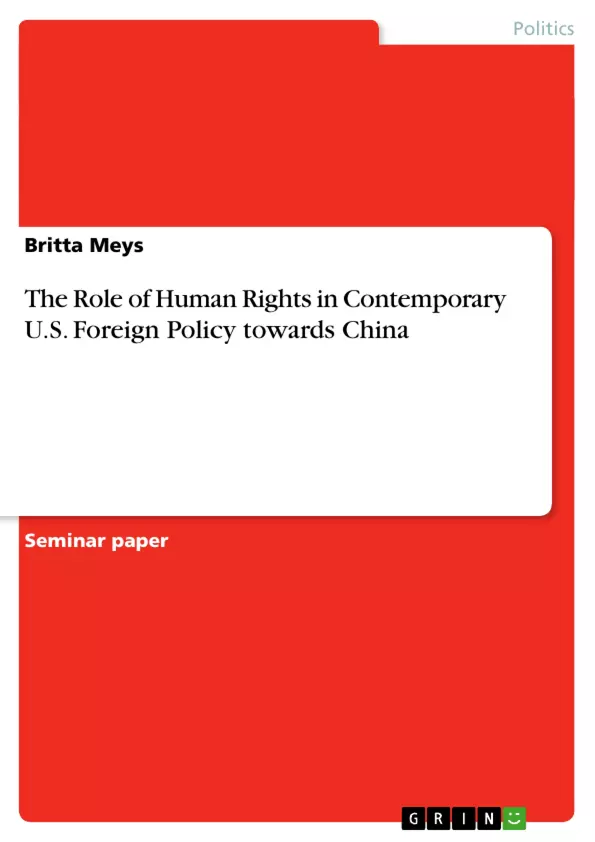Due to economic reforms that were started in the late 1970s, China has stepped into the center of international politics and economy during the past years. These reforms helped the country to achieve an immense economic upturn with annual growth rates of almost ten percent and thus made China an ever more important actor on the international stage of politics.
The United States strongly support China’s economic development by granting it permanent Normal Trade Relations, for example, and investing directly in China’s manufacturing sector. But whereas China has been liberalizing its market, using American interests to gain profits, it largely maintains its defensive and rejecting attitude about changing its human rights situation. There are controversial opinions about how the United States should respond towards China human rights situation.
In order to make aware of the stagnated situation of the human rights issue in U.S. China policy, this paper explores how the Clinton administration handled human rights in China policy and looks at the role of human rights in the Bush jr. administration’s policy towards China.
Inhaltsverzeichnis (Table of Contents)
- Introduction
- Background
- Foundation of Human Rights in Political Theory
- Universality vs. Cultural Relativism
- China's Human Rights Situation
- Human Rights and China Policy during the Clinton Administration
- Bush's China Policy and Human Rights
- Conclusion
Zielsetzung und Themenschwerpunkte (Objectives and Key Themes)
The thesis examines the role of human rights in contemporary U.S. foreign policy towards China. It aims to analyze the Clinton and Bush administrations' approaches to human rights in China, drawing on the historical context of China's economic reforms and its increasing prominence on the international stage. The author explores the conflicting pressures on U.S. policy, balancing economic interests with human rights concerns.
- China's economic development and its impact on international politics
- The tension between economic interests and human rights concerns in U.S. foreign policy
- The evolution of human rights considerations in U.S. China policy under different administrations
- The historical and theoretical foundations of human rights and the debate between universalism and cultural relativism
- China's human rights situation and its implications for U.S.-China relations
Zusammenfassung der Kapitel (Chapter Summaries)
- Introduction: This chapter introduces the central topic of the thesis, highlighting the significance of China's rising influence in international politics and economics. It sets the stage by examining the conflicting perspectives on China's role as a potential threat or a partner to U.S. interests.
- Background: This chapter provides the theoretical groundwork for the thesis by exploring the foundations of human rights in political theory, focusing on the enduring debate between universalism and cultural relativism. It lays the groundwork for understanding the complexities surrounding human rights discourse.
- China's Human Rights Situation: This chapter delves into the specifics of China's human rights record, presenting arguments concerning limitations on fundamental freedoms and outlining the concerns raised about human rights in the context of China's economic and political development.
- Human Rights and China Policy during the Clinton Administration: This chapter analyzes the Clinton administration's approach to human rights in its China policy, examining the strategies employed and the challenges faced in balancing economic interests with human rights concerns.
- Bush's China Policy and Human Rights: This chapter focuses on the Bush administration's approach to human rights in China, analyzing the continuities and changes in U.S. policy towards China in light of the administration's broader foreign policy goals.
Schlüsselwörter (Keywords)
Key themes explored in the thesis include human rights, U.S. foreign policy, China, economic development, political liberalization, cultural relativism, universalism, Clinton administration, Bush administration, and the tension between economic interests and human rights.
Frequently Asked Questions
What is the main focus of U.S. foreign policy towards China regarding human rights?
The main focus is the ongoing tension between promoting human rights and maintaining strong economic ties and trade relations with China.
How did the Clinton administration handle human rights in China?
The Clinton administration struggled to balance economic interests with human rights, eventually delinking China's Most Favored Nation (MFN) status from its human rights record.
What was the Bush Jr. administration's approach to China's human rights situation?
The Bush administration continued to navigate the complex relationship, often prioritizing strategic and economic cooperation while still raising concerns about fundamental freedoms.
What is the debate between universalism and cultural relativism in human rights?
Universalism argues that human rights apply to everyone regardless of culture, while cultural relativism suggests that rights should be understood within the context of a specific society's values.
How has China's economic growth affected international politics?
China's rapid economic rise has made it a central actor on the global stage, giving it more leverage in resisting international pressure regarding its domestic human rights situation.
What are the key human rights concerns in China mentioned in the paper?
The paper discusses limitations on fundamental freedoms, political liberalization, and the defensive attitude of the Chinese government towards external criticism.
- Quote paper
- Britta Meys (Author), 2002, The Role of Human Rights in Contemporary U.S. Foreign Policy towards China, Munich, GRIN Verlag, https://www.grin.com/document/23569



